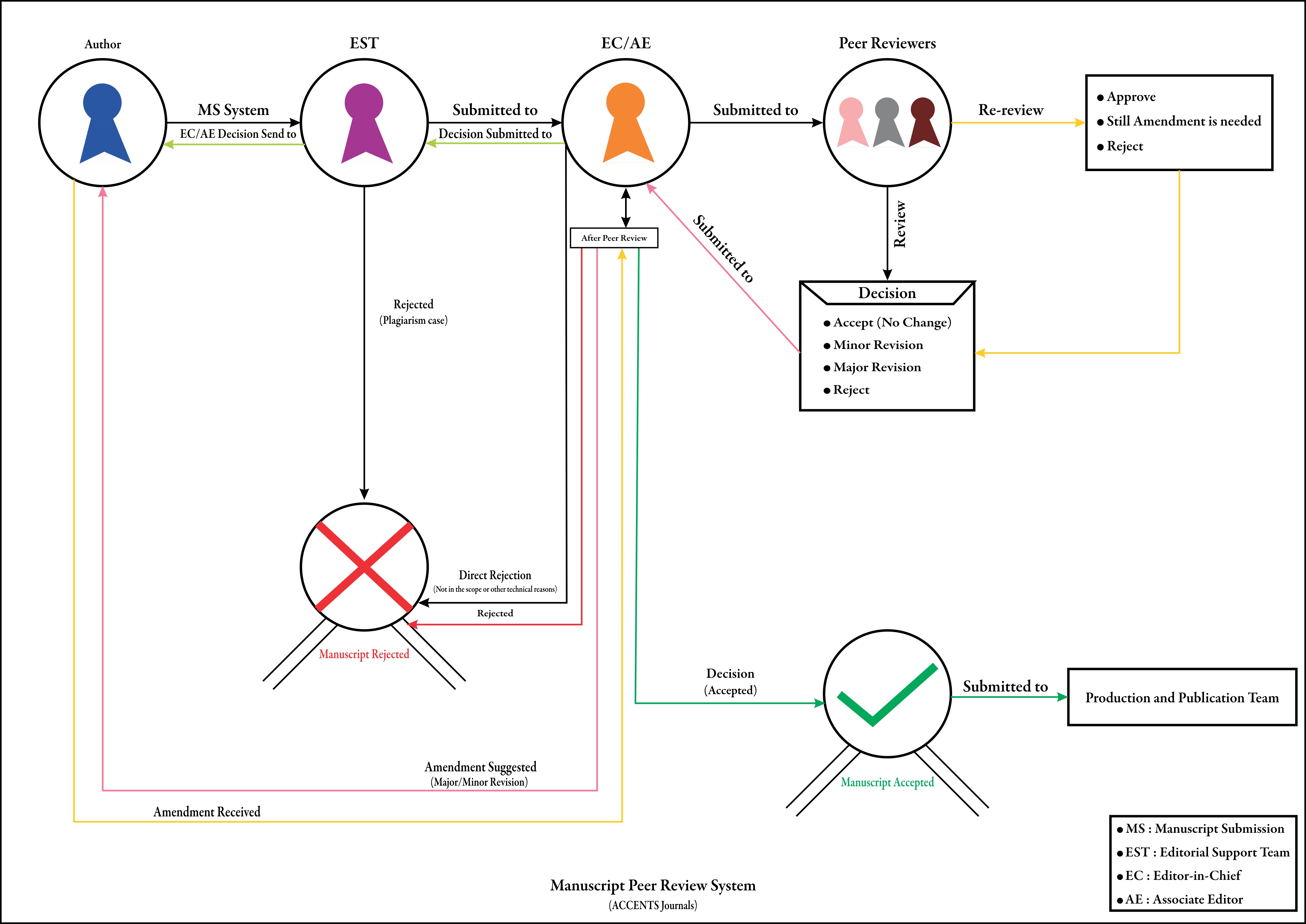The peer review process is a critical component of IJACR, designed to ensure the quality, originality, relevance, and scope of submitted manuscripts. This rigorous evaluation process upholds research integrity and ensures that only high-quality papers are published. All submitted manuscripts undergo the following detailed review process:
Initial Submission
Upon submission, the Editorial Support Team (EST) receives the manuscript and performs an initial screening. The purpose of this step is to:
- Verify adherence to the journal's submission guidelines.
- Conduct a plagiarism check using Crossref Similarity Check.
Manuscripts that do not adhere to the journal's submission guidelines are returned to the authors for resubmission in compliance with the required guidelines. Manuscripts with a high similarity to existing works may be rejected at this stage, and the editor is informed accordingly.
A manuscript may be returned to the authors for revision or rejected if significant issues with grammar or English language are identified.
Editorial Assessment
If the manuscript passes the initial screening, the Editor-in-Chief (EC) or an Associate Editor (AE) conducts the initial assessment. The Editor (EC/AE) evaluates:
- The manuscript's relevance to the journal’s scope.
- Its overall quality and adherence to formatting requirements.
- Its novelty and contribution to the field.
Manuscripts lacking novelty or relevance may be rejected without further peer review. If the manuscript is deemed suitable for peer review, the Editor-in-Chief either handles the manuscript directly or assigns it to an appropriate editor based on the submission's subject area. This assignment is facilitated via an email requesting the editor to manage the review process.
Assignment to Peer Reviewers
Manuscripts deemed suitable for further review are assigned to 3-5 peer reviewers who are experts in the relevant field. The review process is double-blinded, it means that the reviewers do not know the authors of the manuscript and the authors are not aware of anything about the reviewers of the manuscript. Reviewers are selected based on their expertise in the manuscript’s subject area. Editorial board members and external reviewers are mainly responsible for reviewing of manuscripts, writing review reports and suggesting acceptance or rejection of manuscripts.
Peer Review and Recommendations
The reviewers evaluate the manuscript on aspects such as:
- Quality of the research
- Originality and significance
- Methodological rigor
- Results and discussion
- Relevance to the journal’s scope
- Presentation and clarity
Each reviewer provides one of the following recommendations:
- Accept: The manuscript is suitable for publication without further changes.
- Minor Revision: The manuscript requires minor improvements.
- Major Revision: Substantial changes are needed before reconsideration.
- Reject: The manuscript is unsuitable for publication.
Final Decision
The Editor makes the final decision based on the reviewers’ recommendations and their own evaluation. For the decision, the manuscript must be reviewed by at least two experts, with a preference for three reviewers. The final decision is communicated to the author(s) and falls into one of the following categories:
- Accept
- Minor Revision
- Major Revision
- Reject
If revisions are required, the authors must resubmit their revised manuscript, addressing all reviewer and editor comments. The revised manuscript undergoes re-evaluation by the same process before a final decision is made.
Review Timeline
The review process typically takes 8-14 weeks from the peer review start date, though it may take longer in cases where additional reviewers are required at later stages. Generally, reviewers are given 4-8 weeks to review the initial submission. Authors have 3-8 weeks to submit their major or minor revisions. Deadlines may be extended if requested by the authors or reviewers and approved by the editorial team.
Manuscripts Authored by Editors or Editorial Board Members: These are subjected to the same rigorous standards as other submissions. They are assigned to external editors with no affiliation to the authors or their institutions to prevent bias and maintain impartiality.
Submissions
Manuscripts are accepted for review with the understanding that they have neither been submitted to nor published in another publication. Concurrent submission to other publications will result in the immediate rejection of the manuscript.
Ethics and Transparency
ACCENTS adheres to the ethical principles of scholarly open access publishing to uphold and maintain public trust in the research it publishes, benefiting humanity and contributing to research development. Establishing standards for ethical behavior is essential for authors, editors, reviewers, and publishers. These standards are based on COPE's Best Practice Guidelines for Journal Editors , Reviewers , and Authors, as well as guidelines on good publication practices. It is, therefore, mandatory for Journal Editors, Reviewers, and Authors to comply with these guidelines.
Publication Ethics and Malpractice Statement
Publication ethics is a very important part of any open access publication. For details, please click here.


